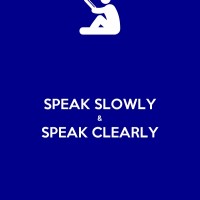Top 10 Ways to Overcome the Fear of Public Speaking
If you were to ask say 100 random people what their biggest fear is odds are that Public Speaking would be a common answer, if not the most common answer. Around 7% of all Americans fear Public Speaking. Whether you like it or not, you’re going to have to do it at some point, whether it’s a school presentation or in a meeting at work. The ability to present is very important to have. Here are some tips to help you conquer your fear and excel at your next presentation.
They say in sports look good play good. Whether or not that's true is up for debate but it helps to look confident. Dress to impress your audience. Don't go outrageous with your attire but being well dressed will go a long ways to helping you feel more confident as long as you are dressed appropriately for the occasion not too casual but not overdoing it either

Dressing neatly really helps as you'll look more presentable, and you don't have to worry about people perceiving you as someone else if you have social anxiety. You'll be more likely to be treated positively this way, thus reducing your anxiety about how people think of you.
This isn't only the for sake of staying hydrated. Keeping a water bottle beside you can be good excuse in case if you need to collect your thoughts before speaking, you can take a quick sip of water and not end up looking awkwardly anxious in front of the audience whenever you feel like you're running out of words to say.

This seems like an obvious thing to consider but it can be easily overlooked if you're not careful. Knowing and understanding your audience will benefit you so you can keep your speech relevant to their interests and keep them engaged easier as well. Different audiences will require different techniques. Tailoring your speech to fit the intended audience will help them be more interested and focused in the speech itself. Also if you happen to have a friend in the audience it can help to focus on them

When you're nervous it's easy to become really quiet when that's the last thing you want to do. You have important information for your audience and they want to hear it! You have to project your voice a little bit so your entire audience can clearly hear you. If you have a microphone available this is simple to do otherwise you'll have to speak up and show your passion a little bit. Feel like you're talking to the back row when you speak. Then you should know you're talking at the right level

You'll have more time to organize your thoughts instead of babbling to get the point across. You will sound more professional and speaking slowly will likely lead into lesser misunderstandings in that way. Make sure not to use filler words in between sentences such as "umm" as you'll most come out as awkward.

They say practice makes perfect. One of the most important things in practice is to feel confidence in yourself so you're ready for the big performance. When you play a sport you practice for that to improve your skills and prepare for the next game. This is the same idea when practicing for your presentation. Practicing in front of your friends or family members can give you a confidence boost and give you some constructive feedback. It's okay if it's not 100% perfect the first time or two that's what your family and friends are there for to help you make it better since they are generally the people who want you to succeed the most.
Notes and PowerPoints are great tools but don't over rely on them. You should be taking notes beforehand but using them during the speech makes you come off as less credible also it's easy to lose eye contact and just read your notes word for word. Whatever you do DON'T do that. As far as PowerPoints go they're great to have but keep it condensed nobody wants to sit through an 80 slide presentation and nobody wants to read an entire paragraph on each slide or hear the slides word for word. Some helpful tips are the rules of 6. No more than 6 bullet points per slide no more than 6 words per bullet point and try to have some relevant picture at least every 6 slides. That will keep your PowerPoints straightforward. Use notes and PowerPoints as a starting point to bounce off of not the backbone of the presentation

Eye contact is important as it establishes credibility and portrays confidence. You don't want to single out a specific person to stare at try and look at everyone in the audience. Acknowledging the audience is important otherwise they won't acknowledge you it's also a sign of respect when talking to someone

This may sound simple but it actually works. It's easy to stress out and talk too fast or too slow. Some simple breathing exercises can help you feel more relaxed and de-stress your body pretty much anything to help calm your mind beforehand is a good thing to do because it's easy to let fear take control.
This is also useful for anything else you are worried about for example an exam.

During a sporting event it's important for athletes to stay hydrated to prevent any dehydration or heat exhaustion. For speaking the same idea applies. You don't want to struggle to speak because your throat is dry. Drink water before your presentation and don't be afraid to drink water during the presentation either
You need to engage the audience preferably early on come up with a creative intro that grabs the audience attention right off the bat. A good opening grabs everyone's attention but the closing is what you leave your audience with which can make your speech memorable that would be a great opportunity for a call to action or something literally anything works here and is better than nothing

What do I mean by this you ask? I mean don't worry about the audience. Majority of the time they don't care about you as much as they care about the information you're giving them. Don't overthink things. Just worry about the information you are sharing and how to share it best with the specific audience. Nothing shows confidence more than someone who has done their homework and knows the material. Don't try and wing it because it won't end well for you most likely